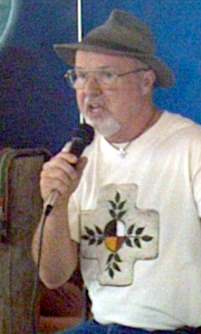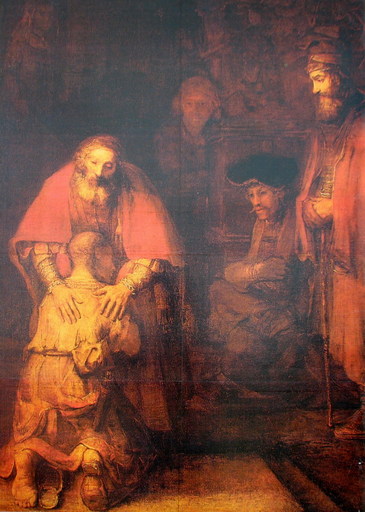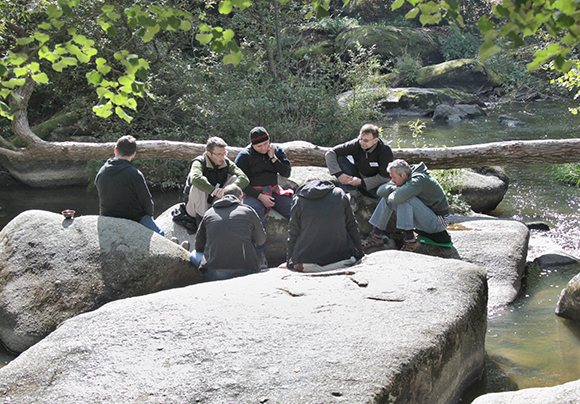
Starý muž, který se neumí smát, je trouba.
Richard Rohr
Kdo jsme?
Tento web reprezentuje hnutí Chlapi, neformální společenství mužů, kteří hledají takové způsoby duchovního prožívání, se kterými se dokážou jako muži ztotožnit a celou bytostí je žít.
Můžeš se tady setkat s muži, kteří usilují o to být lepšími a více autentickými.
Vytváříme jak reálný tak virtuální prostor pro setkávání.
Začalo to někdy před rokem 2000 hledáním mužské energie, spirituality i chlapské party a setkáváním v malých skupinách. Pokračovalo to inspirací dílem Richarda Rohra a jeho Rituálem pro přechod do zralé dospělosti a pokračuje to dodnes stovkami setkání v malých skupinách, víkendovými akcemi pro muže i pro otce a děti, rituály i celostátními setkáními pro stovky účastníků a mezinárodní spoluprací s hnutím mužů po celém světě.
Pro řadu z nás je podstatné přátelství s Bohem, pro všechny jsou oporou kamarádi, které tu nalezli.
Vítáme tě mezi námi a těšíme se na společné putování.

Pavel Hrdina a Martin Šmídek
Překlad meditace CAC z neděle 13. 8. 2023
na téma:
Prorocká cesta - láska a osvobození
| Předpovídání, nikoliv věštění Pro Richarda Rohra proroci nepředpovídají budoucnost, ale zdá se, že předvídají budoucnost, která je pro nás ostatní šokující: Většina proroků se zdá být obyčejnými lidmi, kteří se ocitli s darem. Proroctví v Bibli není záležitostí předpovídání, ale - abychom si trochu pohráli s anglickým jazykem - je to předpovídání. Proroctví je mluvení s takovou předvídavostí pravdy, směřování a nadšení, že poté, co se tak stane, říkáme, že to prorok předpověděl. Nejde o to, že by něco skutečně předpověděli, jde jen o to, že mají nesmírný duchovní vhled. Původní hebrejské slovo pro proroka znamenalo prostě toto: ten, kdo vidí. Prorok je vidoucí, který vidí až do konce. Důvodem, proč mohou proroci tak jasně a silně mluvit v přítomnosti, je to, že posuzují přítomnost ze všech míst, ze všech míst budoucnosti. Proroci vidí do budoucnosti. Jinými slovy, viděli, kam Bůh lidstvo vede. Viděli a přiblížili se k Božímu srdci a vědí, že nás Bůh vede někam, kde je dobře. Protože znají závěr a vědí, kam směřujeme, jsou netrpěliví a rozzlobení na současný stav věcí. Jestliže víme, kam dějiny směřují a k čemu nás Bůh vede; jestliže víme, jaký by náš život mohl a měl být, proč ztrácíme čas vším tím násilím a hloupostí?" Proroci posuzují přítomnost podle perspektivy budoucnosti. Možná právě proto jsme si začali myslet, že proroci předpovídají budoucnost - protože předpovídali budoucnost. Byli to původní futurologové. Přiléhavý teologický výraz pro to je eschatologie. Proroci žijí z této futuristické vize Božího snu o světě, o tom, kam Bůh vede dějiny a kam to všechno směřuje. Proroci jsou tímto konečným ideálním cílem a vizí tak poblouzněni, že jsou vášnivě smutní a rozzlobení z toho, co děláme nyní. Jakmile zakoušíme univerzální Boží bytí, přítomnost se stává tak nespokojená a zklamaná. Divíme se, jak mohou být lidé spokojeni s tak málem a spokojeni s tak laciným životem. [1] Jiným způsobem lze říci, že prorok nám dává směr a vizi celku. Pro většinu lidí byly dějiny zacyklené, nesměřovaly nikam konkrétně. Prorok však dává dějinám cíl, záměr a směr a volá je kupředu. To je zásadní, protože pokud nebudeme mít pocit, že dějiny někam směřují, budeme se točit v kruhu a náš život bude postrádat smysl. Dostáváme se do jakési existenciální absurdity bez směru, v níž uvízne mnoho lidí. Bez eschatologického smyslu pro čas se ocitáme v pasti přítomnosti. Bez slova proroka se náboženství stává pouhou legitimizací statu quo. [2] Fr. Richard Rohr, OFM po DeepL upravil Martin | Forthtelling, Not Foretelling
For Richard Rohr, prophets do not foretell the future, but they do seem to anticipate futures that are shocking to the rest of us: Most of the prophets seem to be ordinary people who find themselves with a gift. Prophecy in the Bible is not a matter of foretelling, but—to play with the English language a bit—it’s forthtelling. Prophecy is speaking with such a forwardness of truth, direction, and passion that, after the fact, we say the prophet foretold it. It’s not that they’re really predicting something, it’s just that they have immense spiritual insight. The original Hebrew word for a prophet meant simply that: one who sees. A prophet is a seer who sees all the way through. The reason prophets can speak so clearly and strongly in the now is because they judge the now from, of all places, the future. Prophets have seen the future. In other words, they have seen where God is leading humanity. They have seen and drawn close to the heart of God and they know God is leading us somewhere good. Since they know the conclusion and where it is that we’re heading, they become impatient and angry at the present state of things. If we know where history is going and what God is leading us toward; if we know what our lives could and should be, why are we wasting time with all this violence and all this stupidity? The prophets judge the present by the perspective of the future. Perhaps that’s how we began to think that prophets foretold the future—because they forthtold the future. They were the original futurists. The fancy, theological word for this is eschatology. The prophets live out of this futuristic vision of God’s dream for the world, where God is leading history, and where it’s all headed. Prophets become so infatuated with that final ideal goal and vision that they become passionately sad and angry about what we’re doing now. Once we experience the universal being of God, the present becomes so dissatisfying and disappointing. We wonder how people can be satisfied with so little and content with such tawdry lives. [1] Another way to say it is that the prophet gives us a direction and vision of the whole. For most people, history was circular; it wasn’t going any place in particular. But the prophet gives history a goal, aim, and direction and calls history forward. This is essential because if we don’t have a sense that history is going somewhere, we will go in circles and our lives will become meaningless. We enter a kind of existential absurdity with no direction in which many people become caught. Without an eschatological sense of time, we become trapped in the now. Without the word of the prophet, religion becomes no more than a legitimation of the status quo. [2] Fr. Richard Rohr, OFM |
[1] Adapted from Richard Rohr, Way of the Prophet (Albuquerque, NM: Center for Action and Contemplation, 1994), audio recording. No longer available for purchase.
[2] Adapted from Richard Rohr, The Prophets (San Antonio, TX: Catholic Charismatic Bible Institute, 1980), audio recording. No longer available for purchase.
Zde se nacházejí překlady Daily Meditations, jejichž anglické originály se nacházejí na webu CAC. V den jejich vydání je zde nalezneš přeložené strojově pomocí DeepL, zpravidla do druhého dne pak projdou jazykovou úpravou někým z týmu překladatelů :-) Pokud vládneš dobrou angličtinou, přihlas se asi raději přímo u zdroje těchto úvah, tedy na webu CAC. Budeš je pak do své mailové schránky dostávat již k ranní kávě. -mš-
 Myšlenka Richarda Rohra na pondělí po první neděli postní - Není žádná země zaslíbená Mojžíšův příběh obsahuje jednu ironii dějin: Mojžíš se do země Izraele nedostal. Viděl ji zdálky, když se díval přes řeku Jordán. Zdálo se, že zemřel dřív, než ji překročil, a tak bibličtí spisovatelé pro to později hledali nějaký teologický význam. Říká se, že na poušti selhal ve víře, takže ho Bůh potrestal. Není …
Myšlenka Richarda Rohra na pondělí po první neděli postní - Není žádná země zaslíbená Mojžíšův příběh obsahuje jednu ironii dějin: Mojžíš se do země Izraele nedostal. Viděl ji zdálky, když se díval přes řeku Jordán. Zdálo se, že zemřel dřív, než ji překročil, a tak bibličtí spisovatelé pro to později hledali nějaký teologický význam. Říká se, že na poušti selhal ve víře, takže ho Bůh potrestal. Není …




